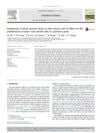 222 citations,
August 2009 in “Experimental Dermatology”
222 citations,
August 2009 in “Experimental Dermatology” Stem cells are crucial for wound healing and understanding their role could lead to new treatments, but more research is needed to answer unresolved questions.
 202 citations,
August 2007 in “Biomaterials”
202 citations,
August 2007 in “Biomaterials” Artificial skin development has challenges, but new materials and understanding cell behavior could improve tissue repair. Also, certain growth factors and hydrogel technology show promise for advanced skin replacement therapies.
 176 citations,
January 2003 in “Journal of Investigative Dermatology”
176 citations,
January 2003 in “Journal of Investigative Dermatology” Bone Morphogenetic Proteins (BMPs) help control skin health, hair growth, and color, and could potentially be used to treat skin and hair disorders.
 December 2015 in “Vascular Pharmacology”
December 2015 in “Vascular Pharmacology” Hair papilla cells are crucial for blood vessel development in hair follicles, affecting hair growth and loss.
February 2019 in “Chin J Injury Repair and Wound Healing(Electronic Edition)” Porcine acellular dermal matrix helps hair growth by boosting specific proteins and signals.
 65 citations,
July 2020 in “Science Advances”
65 citations,
July 2020 in “Science Advances” Dermal exosomes with miR-218-5p boost hair growth by controlling β-catenin signaling.
 16 citations,
December 2019 in “Animals”
16 citations,
December 2019 in “Animals” Overexpressing Tβ4 in goats' hair follicles increases cashmere production and hair follicle growth.
 8 citations,
October 1988 in “Clinics in Dermatology”
8 citations,
October 1988 in “Clinics in Dermatology” Current research explores hair growth drugs, while future research aims for personalized treatments.
 277 citations,
June 2003 in “The journal of investigative dermatology. Symposium proceedings/The Journal of investigative dermatology symposium proceedings”
277 citations,
June 2003 in “The journal of investigative dermatology. Symposium proceedings/The Journal of investigative dermatology symposium proceedings” Epithelial-mesenchymal interactions control hair growth cycles through specific molecular signals.
 7 citations,
February 2023 in “Inflammation and Regeneration”
7 citations,
February 2023 in “Inflammation and Regeneration” The protein interleukin-1 alpha helps regenerate hair follicles and increase stem cell growth in mice.
 54 citations,
June 2003 in “The journal of investigative dermatology. Symposium proceedings/The Journal of investigative dermatology symposium proceedings”
54 citations,
June 2003 in “The journal of investigative dermatology. Symposium proceedings/The Journal of investigative dermatology symposium proceedings” Disruptions in hair follicle fibroblast dynamics can cause hair growth problems.
 14 citations,
November 2020 in “International Journal of Biological Macromolecules”
14 citations,
November 2020 in “International Journal of Biological Macromolecules” Mushroom-based scaffolds help heal skin wounds and regrow hair.
 May 2024 in “Clinical Cosmetic and Investigational Dermatology”
May 2024 in “Clinical Cosmetic and Investigational Dermatology” Manipulating cell cleanup processes could help treat hair loss.
 August 2024 in “Stem Cell Research & Therapy”
August 2024 in “Stem Cell Research & Therapy” New regenerative therapies show promise for treating hair loss.

New insights into cell communication in psoriasis suggest innovative drug treatments.
 October 2024 in “Biology”
October 2024 in “Biology” Dermal papilla cells can help regrow hair and are promising for hair loss treatments.
 27 citations,
April 2017 in “British Journal of Dermatology”
27 citations,
April 2017 in “British Journal of Dermatology” Hair loss involves immune responses, inflammation, and disrupted signaling pathways.
 1 citations,
February 2023 in “International Journal of Molecular Sciences”
1 citations,
February 2023 in “International Journal of Molecular Sciences” Melatonin improves cashmere goat hair quality by increasing follicles and reducing skin aging.

Tissue from dog stem cells helped grow hair in mice.
1 citations,
December 2019 in “Clinical ophthalmology” Bimatoprost eye drops make rabbit eyelashes longer, thicker, and darker, and increase the number of lashes without causing inflammation.
 185 citations,
February 2018 in “Journal of Investigative Dermatology”
185 citations,
February 2018 in “Journal of Investigative Dermatology” Melatonin may benefit skin health and could be a promising treatment in dermatology.
 32 citations,
May 2018 in “Cell Cycle”
32 citations,
May 2018 in “Cell Cycle” Melatonin helps Cashmere goats grow more hair by affecting certain genes and cell pathways.
 1 citations,
July 2016 in “Livestock science”
1 citations,
July 2016 in “Livestock science” Nerve growth factor helps cashmere goat hair cells grow and is more active during the hair growth phase.
 129 citations,
May 2015 in “Cell Stem Cell”
129 citations,
May 2015 in “Cell Stem Cell” Different types of stem cells exist within individual skin layers, and they can adapt to damage, transplantation, or tumor growth. These cells are regulated by their environment and genetic factors. Tumor growth is driven by expanding, genetically altered cells, not long-lived mutant stem cells. There's evidence of cancer stem cells in skin tumors. Other cells, bacteria, and genetic factors help maintain balance and contribute to disease progression. A method for growing mini organs from single cells has been developed.
 51 citations,
January 2004 in “Skin Pharmacology and Physiology”
51 citations,
January 2004 in “Skin Pharmacology and Physiology” The document explains hair growth and shedding, factors affecting it, and methods to evaluate hair loss, emphasizing the importance of skin biopsy for diagnosis.
 2 citations,
January 2014 in “Hair therapy & transplantation”
2 citations,
January 2014 in “Hair therapy & transplantation” New treatments for hair growth disorders are needed due to limited current options and complex hair follicle biology.
 42 citations,
July 2014 in “Journal of biological chemistry/The Journal of biological chemistry”
42 citations,
July 2014 in “Journal of biological chemistry/The Journal of biological chemistry” Heparan sulfate is important for hair growth, preventing new hair formation in mature skin, and controlling oil gland development.
 January 2024 in “Journal of cellular immunology”
January 2024 in “Journal of cellular immunology” Hair follicle stem cells are important for maintaining healthy skin and interact with many signals.
22 citations,
August 2020 in “Cells” TGM3 is important for skin and hair structure and may help diagnose cancer.
 10 citations,
May 2020 in “Dermatology Research and Practice”
10 citations,
May 2020 in “Dermatology Research and Practice” Proteoglycans are important for hair growth, and a specific treatment can help reduce hair loss.



























